- Home
- Paolo Bacigalupi
Windup Stories Page 2
Windup Stories Read online
Page 2
“You always were a cheap bastard.”
Lalji glanced at Creo. “You are lucky it is not forty years ago. Then you would be paddling up this river by hand, instead of lying on your lazy back letting these fancy kink-springs do the work. Then we would be seeing you use those muscles of yours.”
“If I was lucky, I would have been born during the Expansion and we’d still be using gasoline.”
Lalji was about to retort but an IP boat slashed past them, ripping a deep wake. Creo lunged for their cache of spring guns. Lalji dove after him and slammed the cache shut. “They’re not after us!”
Creo stared at Lalji, uncomprehending for a moment, then relaxed. He stepped away from the stored weapons. The IP boat continued upriver, half its displacement dedicated to massive precision kink-springs and the stored joules that gushed from their unlocking molecules. Its curling wake rocked the needleboat. Lalji steadied himself against the rail as the IP boat dwindled to a speck and disappeared between obstructing barge chains.
Creo scowled after the boat. “I could have taken them.”
Lalji took a deep breath. “You would have gotten us killed.” He glanced at the top of the riverbank to see if the IP man had noticed their panic. He wasn’t even visible. Lalji silently gave thanks to Ganesha.
“I don’t like all of them around,” Creo complained. “They’re like ants. Fourteen at the last lock. That one, up on the hill. Now these boats.”
“It is the heart of calorie country. It is to be expected.”
“You making a lot of money on this trip?”
“Why should you care?”
“Because you never used to take risks like this.” Creo swept his arm, indicating the village, the cultivated fields, the muddy width of river gurgling past, and the massive barges clogging it. “No one comes this far upriver.”
“I’m making enough money to pay you. That’s all you should concern yourself with. Now go get the rest of the springs. When you think too much, your brain makes mush.”
Creo shook his head doubtfully but jumped for the dock and headed up the steps to the kinetic shop. Lalji turned to face the river. He took a deep breath.
The IP boat had been a close call. Creo was too eager to fight. It was only with luck that they hadn’t ended up as shredded meat from the IP men’s spring guns. He shook his head tiredly, wondering if he had ever had as much reckless confidence as Creo. He didn’t think so. Not even when he was a boy. Perhaps Shriram was right. Even if Creo was trustworthy, he was still dangerous.
A barge chain, loaded with TotalNutrient Wheat, slid past. The happy sheaves of its logo smiled across the river’s muddy flow, promising “A Healthful Tomorrow” along with folates, B vitamins, and pork protein. Another IP boat slashed upriver, weaving amongst the barge traffic. Its complement of IP men studied him coldly as they went by. Lalji’s skin crawled. Was it worth it? If he thought too much, his businessman’s instinct—bred into him through thousands of years of caste practice—told him no. But still, there was Gita. When he balanced his debts each year on Diwali, how did he account for all he owed her? How did one pay off something that weighed heavier than all his profits, in all his lifetimes?
The NutriWheat wallowed past, witlessly inviting, and without answers.
“You wanted to know if there was something that would be worth your trip upriver.”
Lalji and Shriram had been standing in the winding room of Ganesha Kinetic, watching a misplaced ton of SuperFlavor burn into joules. Shriram’s paired megodonts labored against the winding spindles, ponderous and steady as they turned just-consumed calories into kinetic energy and wound the shop’s main storage springs.
Priti and Bidi. The massive creatures barely resembled the elephants that had once provided their template DNA. Generippers had honed them to a perfect balance of musculature and hunger for a single purpose: to inhale calories and do terrible labors without complaint. The smell of them was overwhelming. Their trunks dragged the ground.
The animals were getting old, Lalji thought, and on the heels of that thought came another: he, too, was getting old. Every morning he found gray in his mustache. He plucked it, of course, but more gray hairs always sprouted. And now his joints ached in the mornings as well. Shriram’s own head shone like polished teak. At some point, he’d turned bald. Fat and bald. Lalji wondered when they had turned into such old men.
Shriram repeated himself, and Lalji shook away his thoughts. “No, I am not interested in anything upriver. That is the calorie companies’ province. I have accepted that when you scatter my ashes it will be on the Mississippi, and not the holy Ganges, but I am not so eager to find my next life that I wish my corpse to float down from Iowa.”
Shriram twisted his hands nervously and glanced around. He lowered his voice, even though the steady groan of the spindles was more than enough to drown their sounds. “Please, friend, there are people…who want…to kill this man.”
“And I should care?”
Shriram made placating motions with his hands. “He knows how to make calories. AgriGen wants him, badly. PurCal as well. He has rejected them and their kind. His mind is valuable. He needs someone trustworthy to bring him downriver. No friend of the IP men.”
“And just because he is an enemy of AgriGen I should help him? Some former associate of the Des Moines clique? Some ex-calorie man with blood on his hands and you think he will help you make money?”
Shriram shook his head. “You make it sound as if this man is unclean.”
“We are talking of generippers, yes? How much morality can he have?”
“A geneticist. Not a generipper. Geneticists gave us megodonts.” He waved at Priti and Bidi. “Me, a livelihood.”
Lalji turned on Shriram. “You take refuge in these semantics, now? You, who starved in Chennai when the Nippon genehack weevil came? When the soil turned to alcohol? Before U-Tex and HiGro and the rest all showed up so conveniently? You, who waited on the docks when the seeds came in, saw them come and then saw them sit behind their fences and guards, waiting for people with the money to buy? What traffic would I have with this sort of people? I would sooner spit on him, this calorie man. Let the PurCal devils have him, I say.”
The town was as Shriram had described it. Cottonwoods and willows tangled the edges of the river and over them, the remains of the bridge, some of it still spanning the river in a hazy network of broken trusses and crumbling supports. Lalji and Creo stared up at the rusting construction, a web of steel and cable and concrete, slowly collapsing into the river.
“How much do you think the steel would bring?” Creo asked.
Lalji filled his cheek with a handful of PestResis sunflower seeds and started cracking them between his teeth. He spit the hulls into the river one by one. “Not much. Too much energy to tear it out, then to melt it.” He shook his head and spat another hull. “A waste to make something like that with steel. Better to use Fast-Gen hardwoods, or WeatherAll.”
“Not to cover that distance. It couldn’t be done now. Not unless you were in Des Moines, maybe. I heard they burn coal there.”
“And they have electric lights that go all night and computers as large as a house.” Lalji waved his hand dismissively and turned to finish securing the needleboat. “Who needs such a bridge now? A waste. A ferry and a mulie would serve just as well.” He jumped ashore and started climbing the crumbling steps that led up from the river. Creo followed.
At the top of the steep climb, a ruined suburb waited. Built to serve the cities on the far side of the river when commuting was common and petroleum cheap, it now sprawled in an advanced state of decay. A junk city built with junk materials, as transient as water, willingly abandoned when the expense of commuting grew too great.
“What the hell is this place?” Creo muttered.
Lalji smiled cynically. He jerked his head toward the green fields across the river, where SoyPRO and HiGro undulated to the horizon. “The very cradle of civilization, yes? AgriGen, Midwest Growers
Group, PurCal, all of them have fields here.”
“Yeah? That excite you?”
Lalji turned and studied a barge chain as it wallowed down the river below them, its mammoth size rendered small by the height. “If we could turn all their calories into traceless joules, we’d be wealthy men.”
“Keep dreaming.” Creo breathed deeply and stretched. His back cracked and he winced at the sound. “I get out of shape when I ride your boat this long. I should have stayed in New Orleans.”
Lalji raised his eyebrows. “You’re not happy to be making this touristic journey?” He pointed across the river. “Somewhere over there, perhaps in those very acres, AgriGen created SoyPRO. And everyone thought they were such wonderful people.” He frowned. “And then the weevil came, and suddenly there was nothing else to eat.”
Creo made a face. “I don’t go for those conspiracy theories.”
“You weren’t even born when it happened.” Lalji turned to lead Creo into the wrecked suburb. “But I remember. No such accident had ever happened before.”
“Monocultures. They were vulnerable.”
“Basmati was no monoculture!” Lalji waved his hand back toward the green fields. “SoyPRO is monoculture. PurCal is monoculture. Generippers make monoculture.”
“Whatever you say, Lalji.”
Lalji glanced at Creo, trying to tell if the young man was still arguing with him, but Creo was carefully studying the street wreckage and Lalji let the argument die. He began counting streets, following memorized directions.
The avenues were all ridiculously broad and identical, large enough to run a herd of megodonts. Twenty cycle rickshaws could ride abreast easily, and yet the town had only been a support suburb. It boggled Lalji’s mind to consider the scale of life before.
A gang of children watched them from the doorway of a collapsed house. Half its timbers had been removed, and the other half were splintered, rising from the foundation like carcass bones where siding flesh had been stripped away.
Creo showed the children his spring gun and they ran away. He scowled at their departing forms. “So what the hell are we picking up here? You got a lead on another antique?”
Lalji shrugged.
“Come on. I’m going to be hauling it in a couple minutes anyway. What’s with the secrecy?”
Lalji glanced at Creo. “There’s nothing for you to haul. ‘It’ is a man. We’re looking for a man.”
Creo made a sound of disbelief. Lalji didn’t bother responding.
Eventually, they came to an intersection. At its center, an old signal light lay smashed. Around it, the pavement was broken through by grasses gone to seed. Dandelions stuck up their yellow heads. On the far side of the intersection, a tall brick building squatted, a ruin of a civil center, yet still standing, built with better materials than the housing it had served.
A cheshire bled across the weedy expanse. Creo tried to shoot it. Missed.
Lalji studied the brick building. “This is the place.”
Creo grunted and shot at another cheshire shimmer.
Lalji went over and inspected the smashed signal light, idly curious to see if it might have value. It was rusted. He turned in a slow circle, studying the surroundings for anything at all that might be worth taking downriver. Some of the old Expansion’s wreckage still had worthy artifacts. He’d found the Conoco sign in such a place, in a suburb soon to be swallowed by SoyPRO, perfectly intact, seemingly never mounted in the open air, never subjected to the angry mobs of the energy Contraction. He’d sold it to an AgriGen executive for more than an entire smuggled cargo of HiGro.
The AgriGen woman had laughed at the sign. She’d mounted it on her wall, surrounded by the lesser artifacts of the Expansion: plastic cups, computer monitors, photos of racing automobiles, brightly colored children’s toys. She’d hung the sign on her wall and then stood back and murmured that at one point, it had been a powerful company…global, even.
Global.
She’d said the word with an almost sexual yearning as she stared up at the sign’s ruddy polymers.
Global.
For a moment, Lalji had been smitten by her vision: a company that pulled energy from the remotest parts of the planet and sold it far away within weeks of extraction; a company with customers and investors on every continent, with executives who crossed time zones as casually as Lalji crossed the alley to visit Shriram.
The AgriGen woman had hung the sign on her wall like the head of a trophy megodont and in that moment, next to a representative of the most powerful energy company in the world, Lalji had felt a sudden sadness at how very diminished humanity had become.
Lalji shook away the memory and again turned slowly in the intersection, seeking signs of his passenger. More cheshires flitted amongst the ruins, their smoky shimmer shapes pulsing across the sunlight and passing into shadows. Creo pumped his spring gun and sprayed disks. A shimmer tumbled to stillness and became a matted pile of calico and blood.
Creo repumped his spring gun. “So where is this guy?”
“I think he will come. If not today, then tomorrow or the next.” Lalji headed up the steps of the civil center and slipped between its shattered doors. Inside, it was nothing but dust and gloom and bird droppings. He found stairs and made his way upward until he found a broken window with a view. A gust of wind rattled the window pane and tugged his mustache. A pair of crows circled in the blue sky. Below, Creo pumped his spring gun and shot more cheshire shimmers. When he hit, angry yowls filtered up. Blood swatches spattered the weedy pavement as more animals fled.
In the distance, the suburb’s periphery was already falling to agriculture. Its time was short. Soon the houses would be plowed under and a perfect blanket of SoyPRO would cover it. The suburb’s history, as silly and transient as it had been, would be lost, churned under by the march of energy development. No loss, from the standpoint of value, but still, some part of Lalji cringed at the thought of time erased. He spent too much time trying to recall the India of his boyhood to take pleasure in the disappearance. He headed back down the dusty stairs to Creo.
“See anyone?”
Lalji shook his head. Creo grunted and shot at another cheshire, narrowly missing. He was good, but the nearly invisible animals were hard targets. Creo pumped his spring gun and fired again. “Can’t believe how many cheshires there are.”
“There is no one to exterminate them.”
“I should collect the skins and take them back to New Orleans.”
“Not on my boat.”
Many of the shimmers were fleeing, finally understanding the quality of their enemy. Creo pumped again and aimed at a twist of light further down the street.
Lalji watched complacently. “You will never hit it.”
“Watch.” Creo aimed carefully.
A shadow fell across them. “Don’t shoot.”
Creo whipped his spring gun around.
Lalji waved a hand at Creo. “Wait! It’s him!”
The new arrival was a skinny old man, bald except for a greasy fringe of gray and brown hair, his heavy jaw thick with gray stubble. Hemp sacking covered his body, dirty and torn, and his eyes had a sunken, knowing quality that unearthed in Lalji the memory of a long-ago sadhu, covered with ash and little else: the tangled hair, the disinterest in his clothing, the distance in the eyes that came from enlightenment. Lalji shook away the memory. This man was no holy man. Just a man, and a generipper, at that.
Creo resighted his spring gun on the distant cheshire. “Down south, I get a bluebill for every one I kill.”
The old man said, “There are no bluebills for you to collect here.”
“Yeah, but they’re pests.”
“It’s not their fault we made them too perfectly.” The man smiled hesitantly, as though testing a facial expression. “Please.” He squatted down in front of Creo. “Don’t shoot.”
Lalji placed a hand on Creo’s spring gun. “Let the cheshires be.”
Creo scowled, but he let
his gun’s mechanism unwind with a sigh of releasing energy.
The calorie man said, “I am Charles Bowman.” He looked at them expectantly, as though anticipating recognition. “I am ready. I can leave.”
Gita was dead, of that Lalji was now sure.
At times, he had pretended that it might not be so. Pretended that she might have found a life, even after he had gone.
But she was dead, and he was sure of it.
It was one of his secret shames. One of the accretions to his life that clung to him like dog shit on his shoes and reduced himself in his own eyes: as when he had thrown a rock and hit a boy’s head, unprovoked, to see if it was possible; or when he had dug seeds out of the dirt and eaten them one by one, too starved to share. And then there was Gita. Always Gita. That he had left her and gone instead to live close to the calories. That she had stood on the docks and waved as he set sail, when it was she who had paid his passage price.
He remembered chasing her when he was small, following the rustle of her salwar kameez as she dashed ahead of him, her black hair and black eyes and white, white teeth. He wondered if she had been as beautiful as he recalled. If her oiled black braid had truly gleamed the way he remembered when she sat with him in the dark and told him stories of Arjuna and Krishna and Ram and Hanuman. So much was lost. He wondered sometimes if he even remembered her face correctly, or if he had replaced it with an ancient poster of a Bollywood girl, one of the old ones that Shriram kept in the safe of his winding shop and guarded jealously from the influences of light and air.
For a long time he thought he would go back and find her. That he might feed her. That he would send money and food back to his blighted land that now existed only in his mind, in his dreams, and in half-awake hallucinations of deserts, red and black saris, of women in dust, and their black hands and silver bangles, and their hunger, so many of the last memories of hunger.

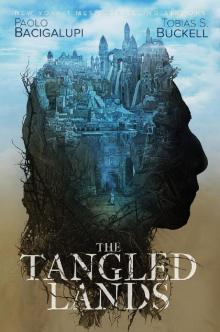 The Tangled Lands
The Tangled Lands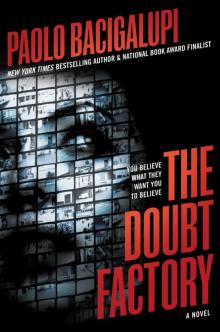 The Doubt Factory
The Doubt Factory Windup Stories
Windup Stories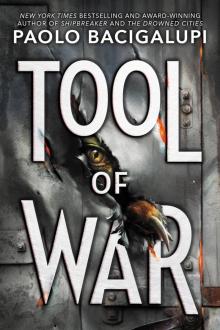 Tool of War
Tool of War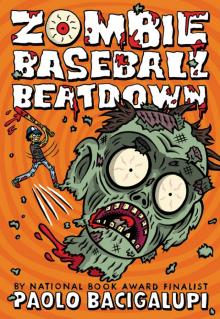 Zombie Baseball Beatdown
Zombie Baseball Beatdown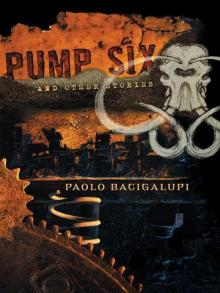 Pump Six and Other Stories
Pump Six and Other Stories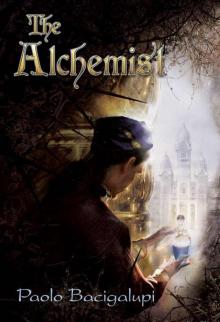 The Alchemist
The Alchemist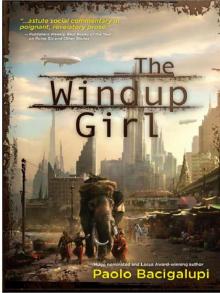 The Windup Girl
The Windup Girl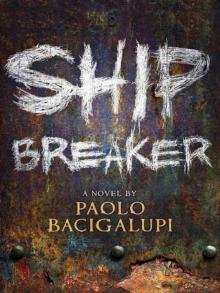 Ship Breaker
Ship Breaker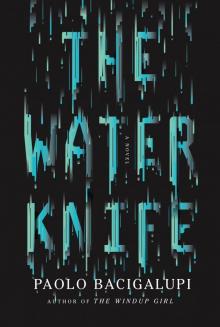 The Water Knife
The Water Knife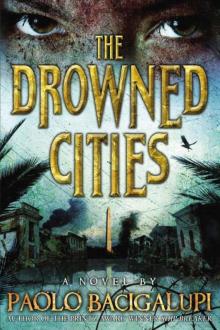 The Drowned Cities sb-2
The Drowned Cities sb-2